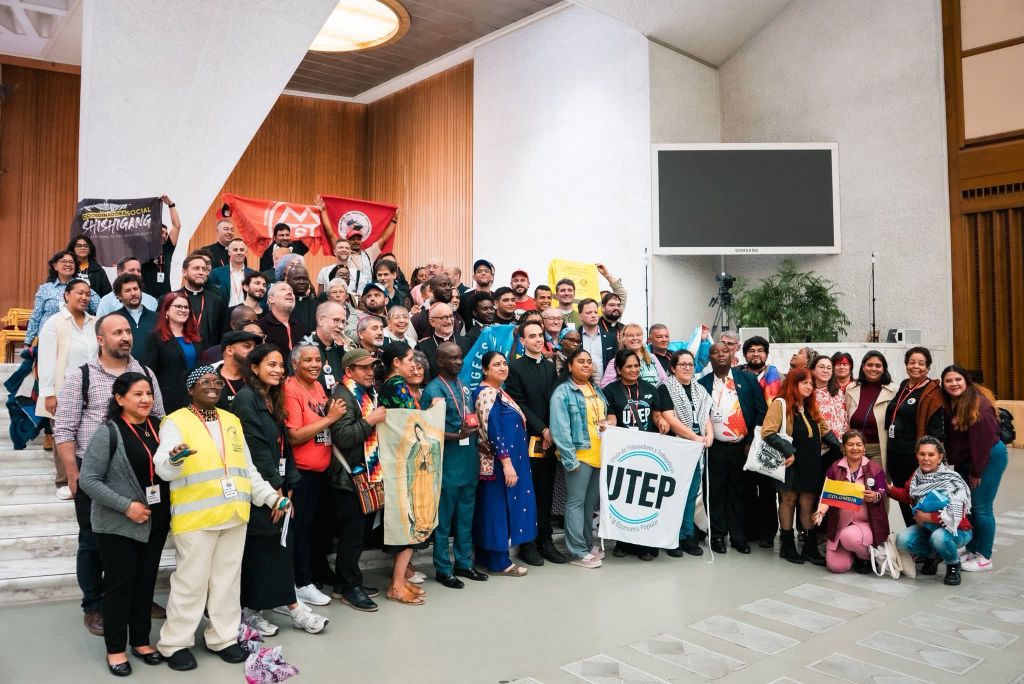
Here are some excerpts from this text,
The WMCW endorses the speech given by Pope Leo XIV to popular movements on Thursday. It is an essential text. It confirms the Pope's commitment to a direction that was already that of Francis. A rejection of global injustices and an unjust system. And above all, a way of thinking that is no longer ‘for’ the poor – those on the margins – but based on them, on their ‘sacred’ rights to land, housing and work. Three of our representatives participated in this assembly: Xaro Castelló, Anna Luque and Maria del Mar González.
Here are some excerpts from this text:"(...) Is demanding land, housing and work for the excluded a “new thing”? Seen from the centres of global power, certainly not; those who have financial security and comfortable housing may consider these demands somewhat outdated. The truly “new” things seem to be autonomous vehicles, fashionable objects or clothing, high-end mobile phones, cryptocurrencies and other such things.
But from the peripheries, things look different; the banner you wave is so relevant that it deserves an entire chapter in Christian social thought on the excluded in today's world.
This is the perspective I would like to convey: new things seen from the periphery and your commitment that is not limited to protest, but also seeks solutions. Often, the peripheries cry out for justice; you do not cry out ‘out of despair’ but ‘out of idealism’: your cry seeks solutions in a society governed by unjust systems. And you do not do this with microprocessors or biotechnology, but starting from the grassroots, from the ground up, with the beauty of craftsmanship. It is poetry: you are ‘social poets’ [2].
Today, once again, you carry the banner of land, housing and work, walking together from a social centre – Spin Time – to the Vatican. This march together testifies to the vitality of popular movements as builders of solidarity in diversity. The Church must be with you: a poor Church for the poor, a Church that reaches out, a Church that takes risks, a courageous, prophetic and joyful Church!"
(...) As Bishop in Peru, I am happy to have experienced a Church that accompanies people in their suffering, their joys, their struggles and their hopes. It is an antidote to a structural indifference that is spreading and that does not take into account the drama of peoples who are stripped, robbed, plundered and forced into poverty. We often feel powerless in the face of all this, but we must counter what I have called a ‘globalisation of powerlessness’ with a ‘culture of reconciliation and commitment’ [3]. Popular movements fill this void generated by the lack of love with the great miracle of solidarity, based on care for one's neighbour and reconciliation.
As I was saying, the standard discourse on “new things” – with their potential and their dangers – overlooks what is happening on the peripheries. People at the centre are largely unaware of the problems affecting the excluded, and when these are mentioned in political and economic discussions, it seems that they are treated as "an issue that is added almost as an afterthought or in a marginal way, when they are not considered as pure collateral damage. In fact, when it comes to concrete action, they are frequently relegated to last place." [4] On the contrary, the poor are at the centre of the Gospel. Thus, marginalised communities should be included in a collective and supportive commitment that seeks to reverse the dehumanising trend of social injustices and promote integral human development.
Indeed, "until the problems of the poor are radically resolved, by renouncing the absolute autonomy of markets and financial speculation, and by attacking the structural causes of social disparity, the problems of the world will not be resolved, nor, ultimately, any problem. Social disparity is the root of society's ills‘
’(...) In the Apostolic Exhortation Dilexi te, I wanted to recall that ‘there have been, and still are, various popular movements, made up of lay people and guided by popular leaders, who are often suspected and even persecuted’. [13] Yet your struggles, carried out under the banner of land, housing and work for a better world, deserve to be encouraged. And just as the Church accompanied the formation of trade unions in the past, so today we must accompany popular movements. This means accompanying humanity, walking together in shared respect for human dignity and in a common desire for justice, love and peace.
The Church supports your just struggles for land, housing and work. Like my predecessor Francis, I believe that just paths start from the local level and from the periphery towards the centre. Your many creative initiatives can be transformed into new public policies and social rights. Your quest is legitimate and necessary. Who knows if the seeds of love that you sow, as small as mustard seeds (cf. Mt 13:31-32; Mk 4:30-32; Lk 13:18-19), will grow into a more humane world for all and help to better manage the ‘new things’.




